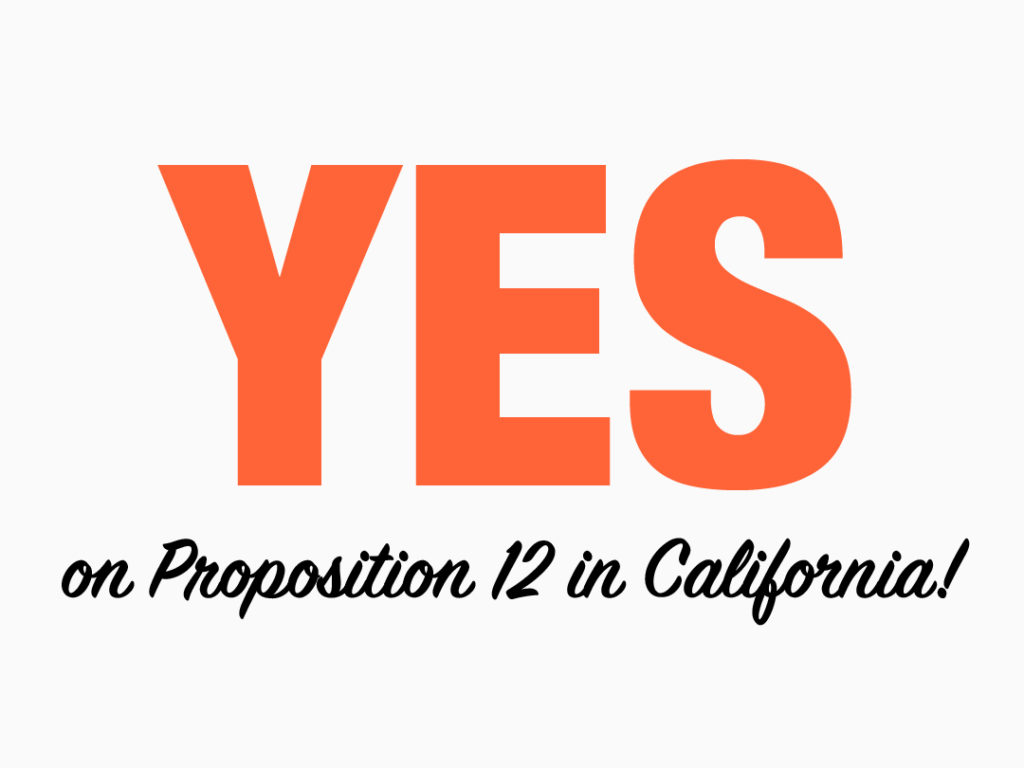There are at least three extraordinarily compelling reasons for Californians to vote “YES” on Proposition 12 in this fall’s election.
First, laying hens shouldn’t be trapped in cages so small that they can barely extend their wings for the days they are alive.
Second, veal calves shouldn’t be hemmed into a crate barely wider than their bodies.
Third, breeding pigs shouldn’t be immobilized in a metal confinement contraption for three miserable, seemingly unending years.
A decade ago, California voters had their say on this set of issues via Prop 2. They voted emphatically to turn the page on the 50-year era of extreme confinement of animals on factory farms and allow animals designed to move the actual opportunity to do so. That measure was reasonable in that it gave farmers, who must bear major capital costs to convert their housing systems, half a dozen years to repurpose or rebuild new operating systems.
Now nearly a decade later, there’s been a surge in cage-free housing systems in California, with millions of birds now living entirely outside of cages.
But some other egg farmers have skirted what voters intended. They kept hens in cages and just slightly reduced their stocking densities, or they jerry-rigged their cages to make them just slightly larger.
That’s better for the birds, but it was most definitely not what voters asked them to do.<
Prop 12 was written to enforce the original verdict of voters.
While the skirting of the law by some farmers was one bad outcome in the wake of Prop 2, there were two particularly good outcomes:
1) The California legislature passed a law to stipulate that all eggs sold in California, regardless of where the farm is, must come from farmers who do not use battery cages, and
2) Major food retailers publicly committed to phasing out their purchases of eggs, pork, and veal from factory farms that severely confine the animals.
Prop 12 reinforces the sales standards on eggs, stipulating that anyone who sells eggs in California must conform to the detailed cage-free standards stipulated in the ballot measure. But just as important, it stipulates for the first time that all pork sold in the state — whether at a fast food restaurant, a grocery store, a hotel restaurant, and any other food-selling outlet — must come from farms that do not confine the sows in gestation crates.
It also applies the same sort of sales standards for veal products, too.
The state of California and its citizens have the constitutional authority to express their values about animal welfare and food safety and say that no food can be sold in the state that doesn’t meet these basic meat and egg production standards.
This is the way that the food retail sector is moving. In the years since voters approved Prop 2, Walmart, Costco, Kroger, McDonald’s and dozens of the biggest meat sellers pledged to go cage-free for their purchases.
The challenge is, they set deadlines — no gestation-crates for pork by 2022 and no cages for hens by 2025, for the most part — that depend on pig and egg farmers shifting their methods of production to meet their massive demand for billions of eggs and billions of pounds of pork.
The pork industry cannot just flip a switch in 2021 and miraculously go to crate-free housing systems in 2022 to supply Walmart and the others. That’s also true for the egg industry; it has 3000 or so major confinement facilities and they cannot convert them all in 2024 to supply the retailers’ wishes in 2025.
The pork and egg industries have to start building new houses for breeding sows and laying hens every year by the hundreds in order to meet these deadlines. These are multi-billion-dollar industries with billions invested in existing housing systems. It takes time, capital, and commitment to affect a transition as massive as the one that animal protection advocates have imagined.
That’s where Prop 12 comes in.
It is a catalyst for the transition in meat and egg production facilities.
Prop 12 accelerates the cage-free and crate-free deadlines for many of these retailers in the massive California market — one of the biggest economies in the world, with nearly 40 million consumers.
Prop 12 means that Walmart stores, McDonald’s outlets, and thousands of food sellers have to meet a de facto cage standard by 2019 and a very specific cage-free standard by 2021 — similar to the deadlines that Massachusetts voters approved in a similar ballot measure in November 2016.
The future of animal-based farming must inevitably be cage-free and crate-free. Prop 12 is a way to guarantee shelf space for farmers who build new, more humane housing systems before the retailers’ national deadlines hit. In other words, it allows them to invest capital in new housing systems now and then in short order recoup their investments by selling products in the California and Massachusetts marketplaces.
There are 38 million consumers in California and seven million in Massachusetts. They are on the front edge of the transition to help the pork and egg industries remake themselves, and they are going to help Walmart, McDonald’s, and so many other food retailers fulfill pledges to do better when it comes to the humane treatment of animals.
There are more than three great reasons to vote “YES” on Prop 12. But helping make the transition to a cage- and crate-free transition for the egg, pork, and veal industries are three of the best reasons to cast a “YES” vote in support of this ballot measure.
